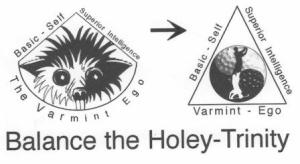BILL MUSTER
Bill Muster is a multi-talented man. He’s a golfer, a travel writer, and an inventor.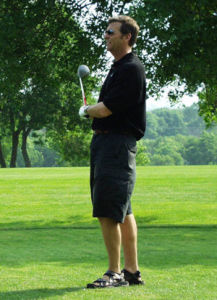
He’s even piloted a steamship down the Mississippi River. Read about his new book Being the Ball, which was favorably reviewed by the LA Times.
Bill is interviewed by his sister Nori Muster, herself the author of five books.
Nori: What inspired you to write Being the Ball?
Billy: By age 30 I had found considerable success in the business world, including a raw, off-the-wall idea, turned into a new product, that overcame industry skepticism to answer a consumer need, and eventually became a new industry standard.
After experiencing the height of success, I realized the rewards of success were empty promises, and rather than chase after more of the same, I left the business world to write full time, and follow my childhood dream to qualify for the US Open.
For two years, I lived hand-to-mouth writing with abandon from midnight to daylight, then I’d grab my clubs and hit the links with an ever-expanding assortment of moron-buddies.
Then, in the 19th Hole, I would collect my winnings, buy a final round, and hit the sack as my buddies partied through Happy Hour.
Nori: Where can people get your book?
Billy: Go to my site Being The Ball
or to Amazon

Nori: I remember you broke a lot of golf clubs in the process. Why did you decide to make them into mobiles?
Billy: Broken golf club mobiles and wind bells artistically freeze the balance of good and evil in that moment when anger is unleashed, clubs are tossed, and shafts are broken. Did your club’s ultimate sacrifice motivate you to rise above the ashes of whatever caused your downfall? I wanted to recycle the broken clubs to create balance.
Nori: So who is this “Ron” that you write about in your book? Is he based on a real person?
Billy: Ron is not a specific person, but a composite character. Ron is the big, loud, obnoxious baby boomer and beyond, that I’ve had the honor to work beside my entire life. Ron is the spice of life, the crazy, fun moron who followed his dreams, no matter how improbable, and has become pseudo-philosophical as he approaches retirement. Ron is full of a lot of things, but especially full of pride in all his accomplishments, the good the bad and the ugly.
Nori: So Ron is a modern metaphor?
Billy: Yes, Ron is crazy-rough around he edges but he loves what he does, he is good at it, and he lives by a surprisingly principled code of honor, giving the shirt off his considerable back for a work pal, or a golf buddy. The golf course and the business world are lousy with Rons and if you are lucky, one or a hundred of them will take you under their bat-like wing to show you the ropes.
Nori: The Los Angeles Times said “Being the Ball is an easy fun read for anyone addicted to the game”. What’s the idea behind your book?
Billy: Being the Ball began as a wacky, romantic comedy about an impossible Cinderella qualification for the US Open, with a plethora of Rons, until the day I saw a better version of that story in the movie Tin Cup.
Nori: Ouch, Tin Cup is one of the best golf movies, what did you do?
Billy: I decided that I couldn’t get into a time machine to change things, so I literally tore up a year of writing.
But after I reached a point of acceptance, I realized the last year playing golf with a rogues-gallery of Rons was by no means wasted. It had inspired the writing of a non-fiction self-help book using golf as a metaphor to find a deeper meaning in life. It morphed into a self-help book for golfers who wouldn’t touch Ekhart Tolle with a 10-foot ball retriever.
The only thing worse than a year of writing down the drain was the dawning of a realization that I was not touched by the hand of the golf gods. Or if touched, it was somewhere down by my butt.
Nori: Being the Ball introduces six golf gods. What part do they play in the story?
Billy: The golf gods rule the game of golf, and they’re based on the Greek gods. They teach you that you’re not a god, but you can aspire to be the best human you can be.
For instance, the god of golf is Figureditout confounds you when you have a great round, a great shot, or a great day, or whatever. You might say, “I’ve figured out my swing. All you have to do is this.” Then Figureditout will give you the opposite of your desires.
Nori: So golf is one of those sports where you go to it with beginner’s mind, no matter how great you played before.
Billy: The point is, golf makes you realize that you have to be happy with the best you can do, because you’re not a god. Then you can recognize that the most important thing is how you react when you didn’t get what you want.
Nori: In the second half of your book, it all goes downhill. The protagonist seems to have a terrible time. What’s going on?
Billy: The story starts off where he’s had a career outward nine holes, and his ego assumes that he is halfway to a career 18-hole score. He writes some checks that his ability cannot cash, and the second half of the book shows that golf can go from the penthouse to the outhouse and teaches how to control the Varmint Ego Mind.
Nori: What is this “Varmint Ego Mind”? 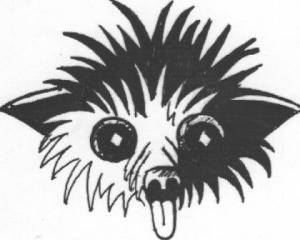
Billy: Your Varmint Ego Mind is the belligerent, lowest part of you that feels inferior to no one, yet condescending to everyone and everything. Ego’s efforts toward self-preservation do offer some survivalist benefits. However, your Varmint goes beyond the essential pursuits of food, wealth or reproduction, to undermine every authority to which it feels subjugated.
Nori: Sounds dangerous.
Billy: Your Varmint is not the cuddly, dancing gopher from Caddyshack. It is a loose cannon that will challenge your command whenever you are distracted, by running roughshod over your decision-making process. Accept right now that your Ego Mind is not your most trusted advisor but a mutinous first mate who lies in wait to abuse every trick in the book, to lock you in the brig, take the helm, and sail headlong onto the worst possible course.
Golf’s Hole-y Trinity is perfectly balanced when it is comprised of three equal parts of your Basic Self, Superior Intelligence and Ego, but given any opportunity your Varmint will inflate to a point where your Basic self and Superior Intelligence are all but crowded out.
Nori: So when the Varmint Ego Mind gets out of control, what can you do?
Billy: Well, first you must stop for a moment and ask, “Is my Varmint Ego Mind out of control?” If you have to ask that, it probably is, so you can then go through a series of five cartoon checklists in the book, like firing off a SHAM Rocket: “Stuff Happens, Accept it, and Move on.”
Or the Present Moment Acid Test, where you ask yourself, “If I could go back in time and change only one thing, would this be it?” Because very few golf shots would qualify, it becomes clear that a spoiled golf round must not be that important.
The last of the cartoon checklist is called, “Being the Phoenix.” You say, “It is the way that it is. So how can I rise from the situation to make something good of it?” Then you realize that the golf course is a practice range to learn to accept things in your off-course life, too.
Nori: So it’s a path to enlightenment?
Billy: Balancing Golf’s Hole-y Trinity is that miraculous moment when your Basic Self teams up with your Superior Intelligence to thwart your Ego-mind’s mutiny, and restore your golf psyche into three equal parts. Whenever you pay attention to the relationship between your three selves, your Superior Intelligence will emerge from its position of Silent Observer, causing your Ego-mind to fall down and play dead. Then you can use that fleeting moment of clarity to accept your predicament, optimistically appreciate the good, realistically accept the bad, and chart an exit strategy.
Nori: The inward-nine, or second half of Being the Ball, is called the Cart-path toward Golf Awareness. What does that mean?
Billy: The entire book is a step-by-step guide to teach the un-aware golfer to be aware of the epic on-course battle against their own Varmint Ego Mind.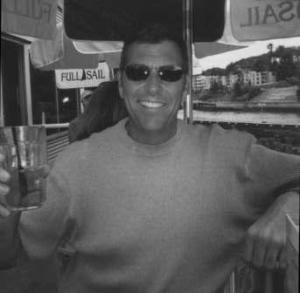
At the end the reader will attain Golf-Awareness, because they will now be aware of the battle against themselves, and now have the tools to do battle once a round, or even once a month. Then, it is just a matter of how often they decide to fight their out-of-control Varmint Ego Mind.
Then in the book’s final chapter, Golf-Awareness is revealed as Self-Awareness, because the battle against your worst self can be fought in your off-course life.
Golf is a practice range for the game of life, where all the same rules apply.
BILLY’S OFF-COURSE LIFE
Nori: How did you get into the consumer electronics business?
Billy: I was born into it. Several branches of my family were in the hi-fi business, as they called it then. I started at age thirteen, working in the warehouse and then the sales floor of my stepfather’s Hi-Fi retail store in Phoenix. After college graduation I went right into was then called the stereo business.
Nori: What was the first product that you sold?
Billy: Fresh out of Arizona State, I worked for Koss headphones, which was doing great as an accessory to the brand new Walkman. Then I went to work for Denon, because they had one of the first CD players. After that, I worked for a company that made mounts and furniture specifically designed for flat panel TVs, which was at the cutting edge.
I always want to work for a company that sells whatever is the most popular gift for Christmas.
Nori: Tell us about that wildly successful product you invented?
Billy: I was working for Denon, selling the hell out of the brand new Compact Disc players. Everything was great, but my Japanese golf-buddy was finding little success selling blank cassette tapes and the company threatened to recall him home. His weekly golfing losses were like a part-time job, so I spent a weekend trying to think up improvements to the cassette tape as CDs were in the middle of replacing vinyl records.
After recording the top-selling CD by Dire Straits, Brothers in Arms, the tape ended in the middle of the last song. Suddenly I realized that CDs had room for an extra song, so we should increase the recording time beyond the standard 90 minutes. Our competitors scoffed, but the Denon 100-Minute Cassette Tape was wildly successful, it won an award for the Consumer Electronics product of the year in 1987, and we sold millions in the two years it took Maxell, TDK, Memorex, and Sony to copy.
Nori: I want to talk about our father, Billy Muster. Our dad was a businessman, but at heart he was a photographer and journalist. He always told me he wanted a job where he could use his creative skills in his work, like his travel photography and once he had the studio.
Billy: Yeah, but for me it was always more that I wanted to follow in his footsteps in the consumer electronics industry, which he did for about fifteen years.
Then he went off on that crazy, fun stuff, like running the steamboat. And he built the post-production studio CCI really toward the end. He had a string of successful businesses, and he went from one to the next to the other. He was into a lot of unrelated fields, but they all showed great success.
Nori: He worked out of the same office at 6900 Santa Monica Boulevard in Hollywood from 1961 until he died in 1989.
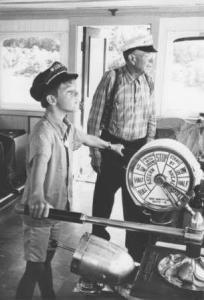
We went on the Delta Queen Steamboat every summer as kids, but you actually worked on it.
Billy: Like every kid after reading Mark Twain, I wanted to be a cub-pilot. I was able to fulfill that dream because our dad ran the Delta Queen, an overnight passenger steamboat on the Mississippi River.
Starting at age nine, I rode for month at a time as a really summer camp training to be a cub pilot. Finally at age thirteen I lied about my age and worked every summer through high school and college as a deckhand and lounge porter on the Delta Queen.
Nori: So there’s been a lot of writing projects where we have teamed up. Either I was editing your stuff, or you were editing mine. We come from a family of writers, don’t we?
Billy: Let’s see, our mom is a freelance writer. She has published a lot in the local paper, the Arizona Republic, starting in 1970. She also writes for Ladies Home Journal, Reminisce, and other publications.
Dad was definitely a writer. His books, Traveler’s Almanac series had their own imprint under Rand McNally. Our Aunt Tina is a writer with her own books. It’s only logical that you and I turned out to be writers.
Nori: It was Dad who first confirmed my idea to write Betrayal of the Spirit. But by then he was in the late stages of cancer. He told me I would have to write it on my own, but he thought it was a great idea. Since then I have written five more books, and built my websites Steamboats.com
and Surrealist.org
Anyone who knows you already knows the answer to this, but what’s your favorite golf movie?
Billy: Caddyshack, because it’s a non-religious fountain of knowledge about self-awareness, and the slobs against the snobs. I also like Tin Cup because it was much better than my torn-up version, written twenty years ago.
Nori: Who do you see as the audience for your books?
Billy: Being the Ball is for those golfers voted least likely to even consider a spiritual awakening. It describes the philosophical theories of every religion, using Caddyshack as its religious text.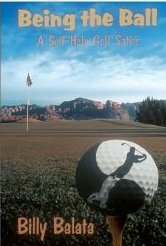
Nori: Where can people get your book?
Billy: Go to my site Being The Ball or to Amazon
